Indexing & metrics
Scopus, ESCI, ERIHPlus, Google Scholar, MIAR... See more
Social network
Academia.edu, Twitter
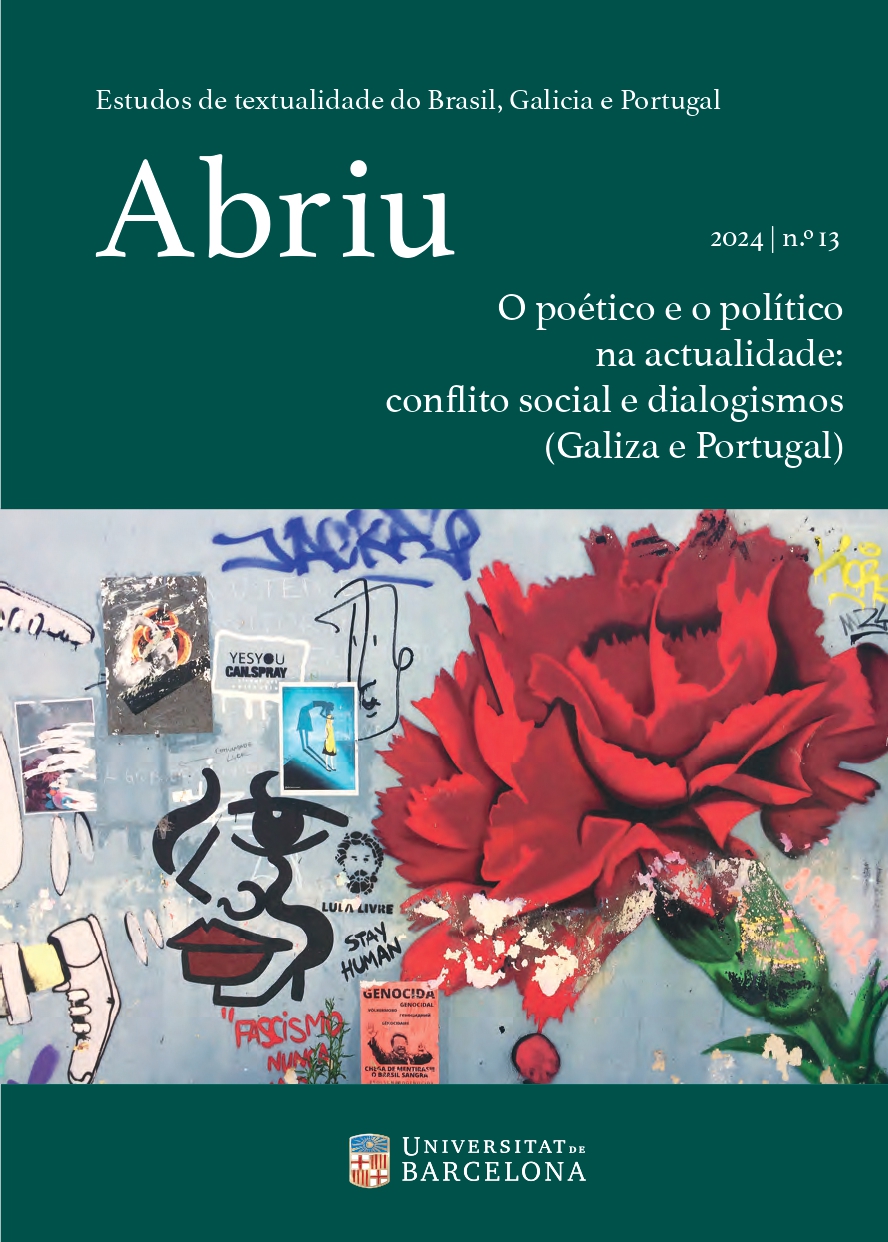
Burghard Baltrusch (Ed.)
The studies collected in this issue exemplify key lines of inquiry from the project "Contemporary Poetry and Politics: Social Conflicts and Poetic Dialogisms" (POEPOLIT II, 2019-2024 on Galician and Portuguese literatures. As a result of contemporary poetry's strong alignment with political and public discourse, the studies presented here include examples that make evident references to conflicts driven by neoliberal economic structures, the logic and control of the state, the regulation of information and the body, heteropatriarchy, cultural and linguistic differences, animal ethics and the exploitation of other species, resource extraction, and questions of identity, social, communal, or interpersonal relations, as well as affective dynamics. Despite their cultural, generational, and stylistic differences, the texts examined here collectively represent a significant array of contemporary poetics and poetry of resistance.
The "Miscellany" includes studies on the fictional representation of returnees in Portugal, the itineraries of towns marginalised for sexual reasons, science fiction in Brazilian youth literature and the relationship between music and identity in Galicia.
The Open Space, taking into account the 50th anniversary of the 25th of April gathers reflections and witnesses from different points of view, both inside and outside Portugal and from different generations: Walter Hugo Mãe, Maria de Lourdes Pereira, Rui Teixeira, Perfecto Quadrado and Isabel Soler.
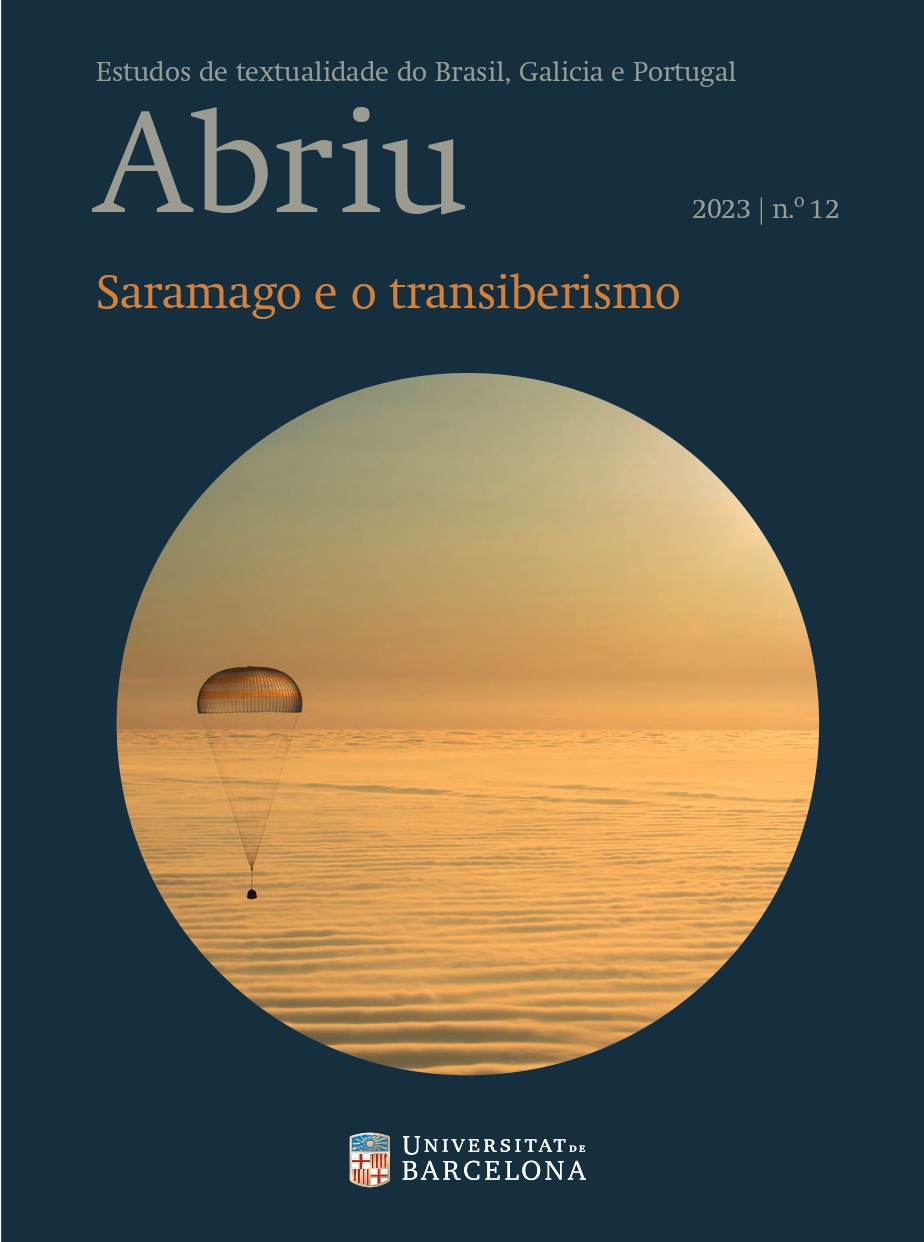
Víctor Martínez-Gil (issue ed.)
Volume 12 of Abriu, journal of Galician and Portuguese Studies of the University of Barcelona opens with a monograph dedicated to "Saramago and transiberism" where four articles are presented that analyze the meaning of Iberism in Saramago's work and the evolution of his political thought towards the concept of transiberism. The "Miscelánea" includes six works in which there is a predominance of analyses of the reception of authors such as Jorge Amado in Africa, Galician women poets through criticism and Galician theater in Buenos Aires, or themes such as Portuguese national myths in Brazil. There are also studies on Carolina Maria de Jesús, Manuel Rivas and Xesús Fraga. In the "Open Space" there are tributes to professors Basilio Losada and Allan Freeland, together with a presentation of the Nélida Piñón library. The reviews are dedicated to overviews of Luso-African and contemporary Brazilian literature, cultural networks and a new reading of Saramago.
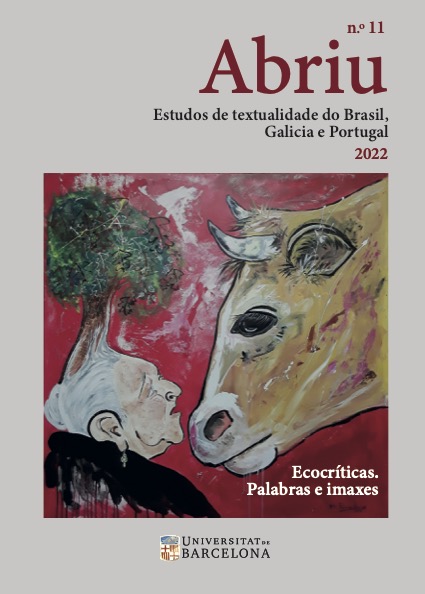
Ana Acuña and Mª Xesús Nogueira (issue eds.)
Volume 11 of Abriu, journal of Galician and Portuguese Studies of the University of Barcelona opens with a monograph dedicated to "Ecocritiques: Words and Images" which presents seven articles analysing discourses and practices that explore artistic creations, often hybrid, where nature and gender intersect. This monograph is complemented by articles in the "Open Space"; section on two artistic research experiences and on the poetry of Luísa Villalta. The "Miscellaneous" section includes three works on medieval profane lyric poetry and a study on the relationship between literature and tourism in Portugal. The reviews are devoted to works on historiography, Iberian feminisms, translations of Haroldo
de Campos and the centenaries of Jorge de Sena and Sophia de Mello Breyner.
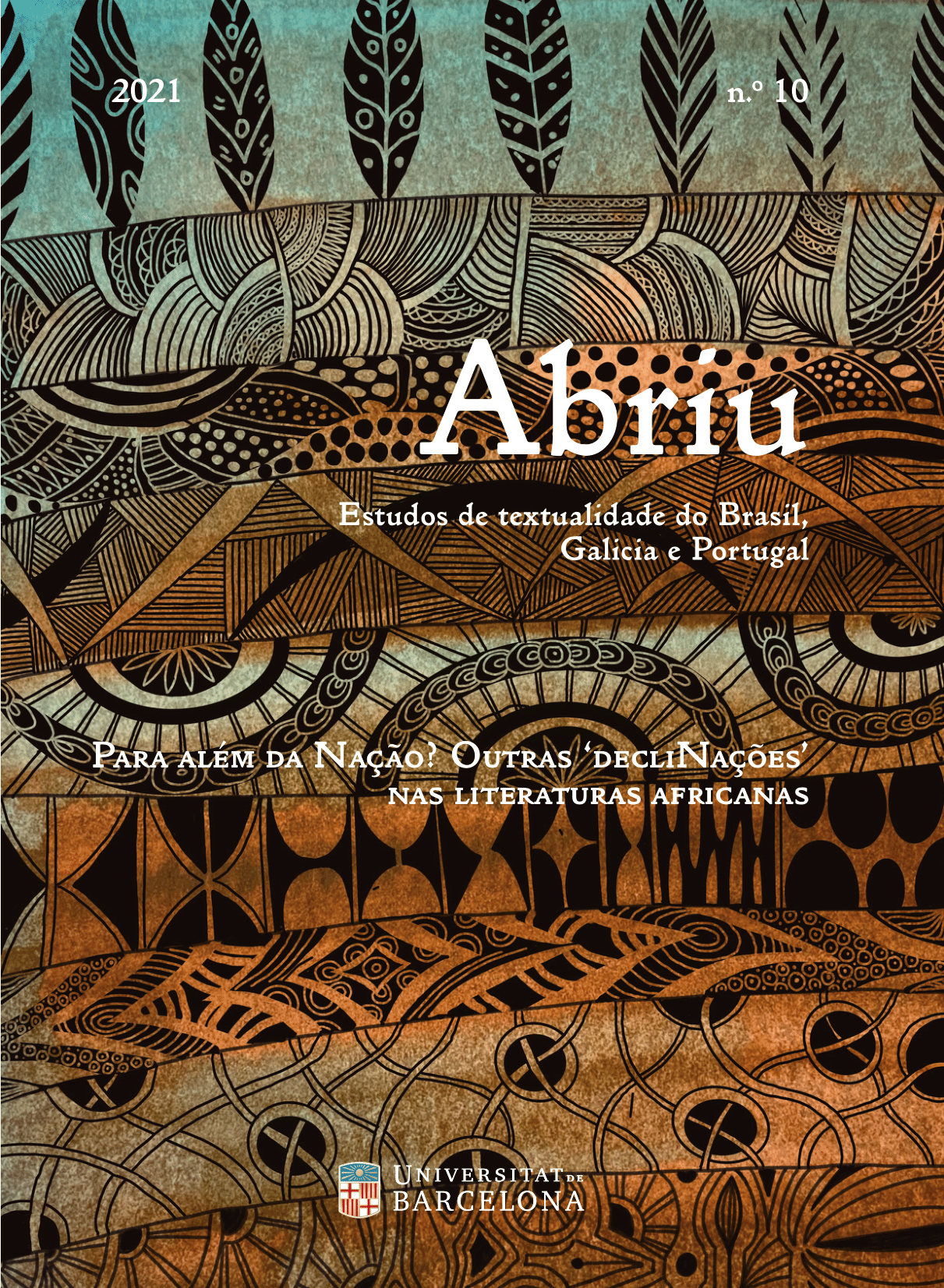
Jessica Falconi (ed.)
Volume 10 of Abriu, the journal of Galician and Portuguese Studies at the Universitat de Barcelona and the Cátedra José Saramago / CLP Instituto Camões, Universitat Autònoma de Barcelona, opens with a monograph dedicated to “Beyond Nationhood: Other ‘Declensions’ in African Literatures”, which includes six approaches to the evolution of the national perspective in the studies of Lusophone African Literatures from the 1980s to the present. The “Miscellany” section includes works on Rosalía de Castro, Annette Meakin, Lúzia Romão and Lupe Gómez, and the new tendencies in the portuguese Literary festivals. The section “Open Space” rescues the galician version of seven poems of “Lírica inglesa” published by Ramón Cabanillas and some documents of the censorship in 1975 about Sempre en Galiza by Castelao. The “Reviews” section includes notes on recent books of Chus Pato, José Rui Teixeira, on Iberian Studies and Catalonia, and on a translation of Clarice Lispector into Catalan.
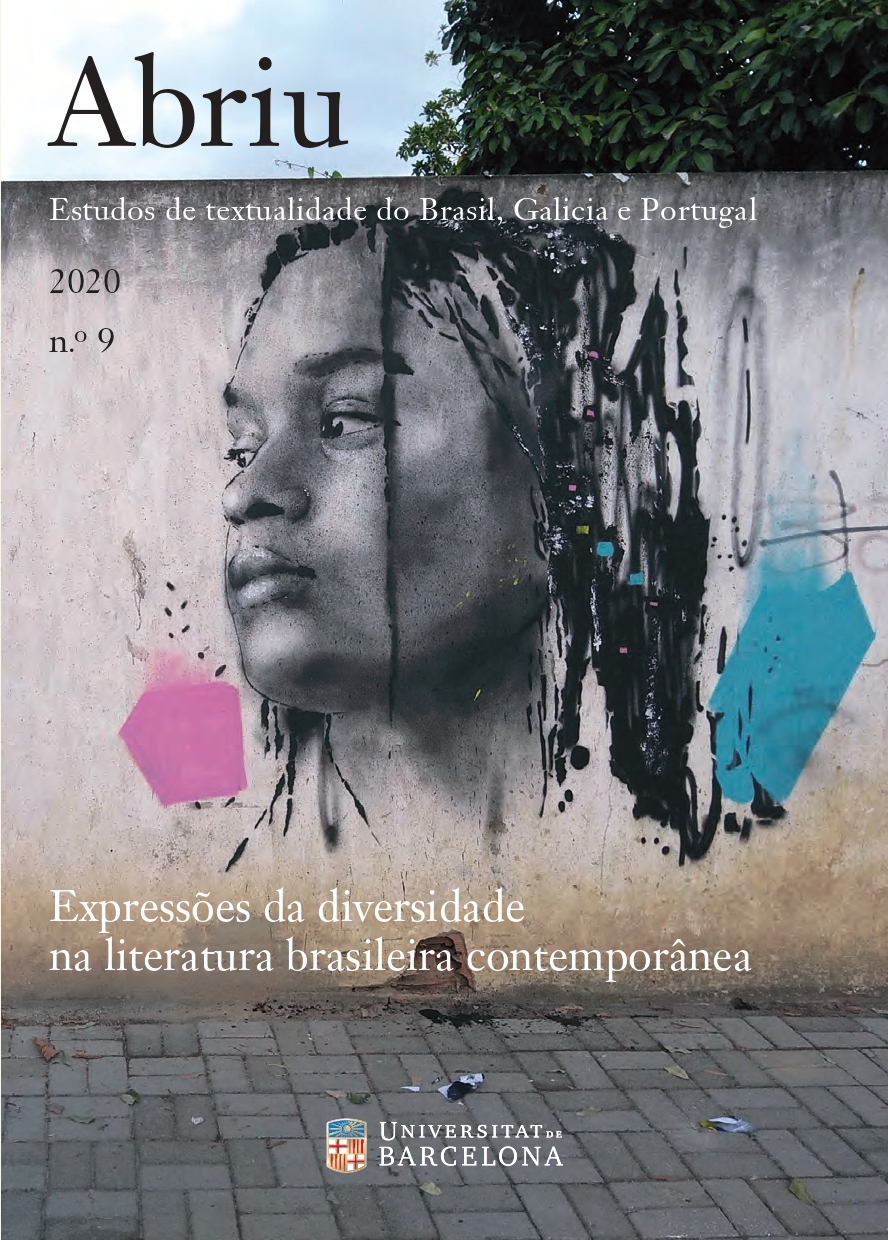
Virgínia Maria Vasconcelos Leal (ed.)
Volume 9 of Abriu opens with a monograph called "Expressions of Diversity in Contemporary Brazilian Literature" directed by Professor Virgínia Maria Vasconcelos Leal. This monograph highlights the relationship between expressions of diversity and contemporary Brazilian literary production, which allows us to value both non-conventional literary objects and innovative formulations.
The Miscellaneous section combines contributions such as the one devoted to the concept of "blackness" in medieval Galician-Portuguese lyric, a paper on the imaginary built by French and English travellers about Portuguese culture in Brazil during the modern period and also a reading of Antón e os inocentes by Méndez Ferrín. It also includes an approach from the identity perspective of the novels A Veiga e como un tempo distinto (2011) by Eva Moreda and Las mujeres inglesas destrozan los tacones al andar (2007) by Almudena Solana and, finally, a review of the Galician Studies in the recent social and political context of Galicia.
The Open Space section contains two unpublished letters by Concepción Arenal, some considerations on the attribution of some articles to Rosalía de Castro and, last but not least, the journal Abriu pays tribute to Perfecto E. Cuadrado, on his retirement as Professor of Portuguese Philology at the University of the Balearic Islands.
In the reviews section, we analyse the commemorative edition of Horácio Costa's work, a volume on Galician Studies that has been made outside Galicia, the translation into Catalan of Samuel Usque's messianic text Consolació de les tribulacions d'Israel and, lastly, a compilation of texts that will surely be a boost to feminist studies in Brazil.
Volume 9 of Abriu is published both in paper and electronically as an e-book (see Edicions de la Universitat de Barcelona). Further information: http://revistes.ub.edu/Abriu.

Ximena Urbina and Luís Filipe F.R. Thomaz (ed.)
Volume 8 of Abriu, the journal of Galician and Portuguese Studies at the University of Barcelona and the José Saramago Chair at the Autonomous University of Barcelona, opens with a monograph dedicated to “Rounds Around Magellan”. This monograph includes new approaches to Magellan navigation signed by specialists from Portugal, Chile, and United States who analyze documents, lexical issues, the travel, and the transmission of Pigafetta account from a new point of view. The “Miscellany” section includes works on Renaissance science in Portugal, masculinities in Machado de Assis’ novels, the topic of fascisms in Saramago and Javier Marías, the utopia according to Zweig in his Brazilian stay, and an approach to the archetype of the Great Goddess in Méndez Ferrín’s fiction. ABRIU launch a new section, “Open Space”, with the aim of publishing unique documents. In this number M.X. Lama rescues two lost articles attributed to Rosalía de Castro. The “Reviews” section includes notes on recent books on feminisms in Galician children’s and YA fiction, Iberian Studies, afrodescendant writer Carolina Maria de Jesus, and the Catalan translation of Fernão Mendes Pinto’s Pilgrimage.
It is published simultaneously in print and electronically, as an e-book (see Edicions de la Universitat de Barcelona). Further information: http://revistes.ub.edu/Abriu.
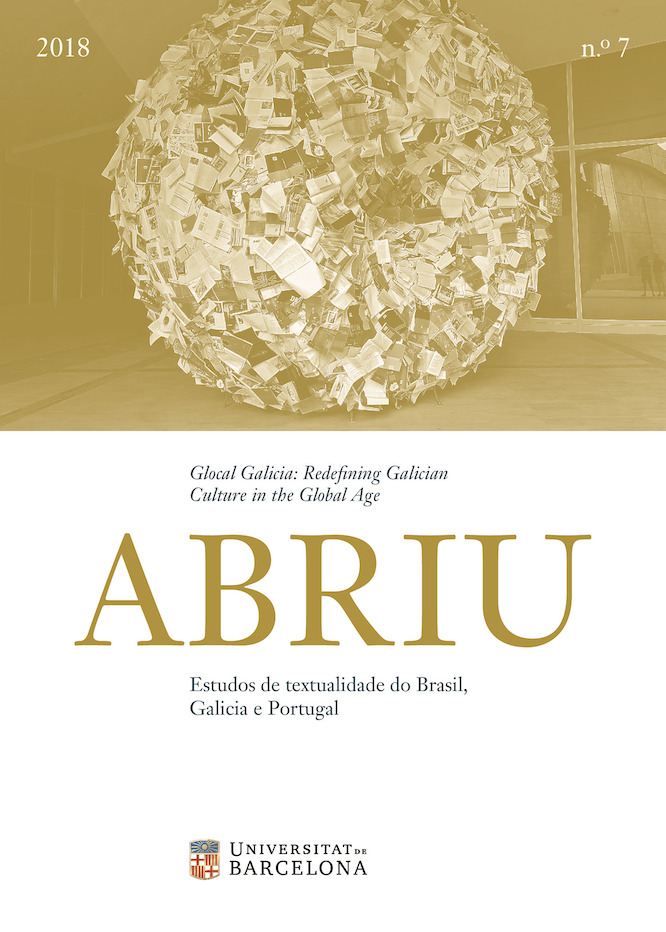
José Colmeiro (ed.)
Volum 7 of Abriu, the journal edited by Galician and Portuguese Studies of the University of Barcelona and José Saramago Chair / CLP Instituto Camões, Autonomous University of Barcelona, opens with the monograph "Glocal Galicia: redefining Galician Culture in the Global Age", edited by José Colmeiro, in which specialists from New Zealand and United States universities have participated. The articles analyze the recent documentary production, in particular Lois Patiño’ films, the digital heritage, the disneyfication of Santiago de Compostela and the fictionalization of a queer transnational Galician identity in Mario Regueira. The "Miscellaneous" section includes studies on the Second Republic and the Spanish Civil War in the Spanish-Portuguese nationalism and in Carlos Drummond de Andrade’s poetry. It is completed with studies of the unpublished correspondence between Rafael Dieste and María Zambrano, contemporary art in a novel by Ricardo Lisias, and an approach to Emma Ríos as an author of a graphic novel. The "Reviews" section includes notes on translations from Portuguese to Catalan, the biography of Rosalía de Castro by M.X. Lama and a book by J. Colmeiro on Galician culture in globalization. It is published simultaneously in print and as an e-book. Further information: http://revistes.ub.edu/Abriu.
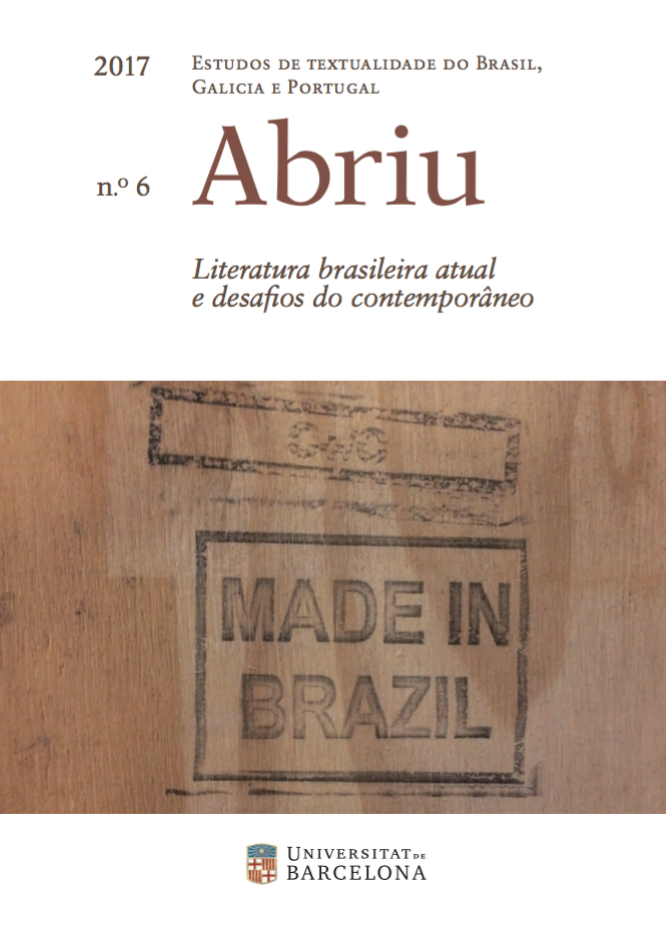
M. Carmen Villarino Pardo (ed.)
Volume 6 of Abriu, the journal edited by Galician and Portuguese Studies at the University of Barcelona, opens with the monograph "Contemporary Brazilian literature and current challenges", edited by Carmen Villarino, a contribution to the discussion on the profound changes that were produced in the cultural field in the beginning of 21st century. The articles analyze the roles of writers and critics, the fictional work of Marcelino Freire, André Sant’Anna’ and Marcelo Mirisola, the culture of the periphery fostered by saraus, and the internationalization of the culture through translations into English. The “Miscellaneous” section includes articles on: Silvio Santiago and censorship, Abel Neves, Elvira Riveiro, and the knowledge about cloves revealed in Garcia de Orta’s treatises. The “Reviews” section includes notes on the Estudos de literatura brasileira contemporánea’s monograph on periferia culture, comparative gender studies, dubbing and the Spanish anthologies of Rui Knopfli’s poems and Galician poetry, respectively.
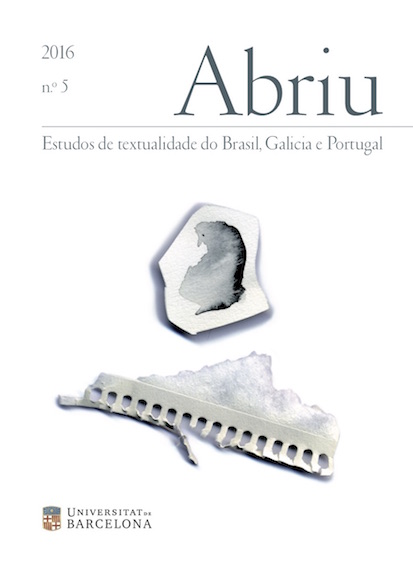
Antonio Sáez Delgado (ed.)
Volume 5 of Abriu, the journal edited by Galician and Portuguese Studies at the University of Barcelona, opens with the monograph "The ‘Livro do Desassossego’ by Fernando Pessoa, A Challenge for Translators/Editors)", edited by Antonio Sáez Delgado. This monograph reflects on the importance of those people often considered mere mediators –editors and translators–, but who in this case become (re)creators of a text in continual mutation, thereby updating the state of the question. The “Miscellaneous” section includes articles on feminist criticism in children’s and young adult’s literature, on the musical group Ataque Escampe, on the writer Uilcon Pereira and the favela-bairro. The “Reviews” section includes notes on “Pessoa y España” by A. Sáez, monographs on Brazilian literature by Regina Dalcastagnè and Antonio Maura, and an edition of Cunqueiro.
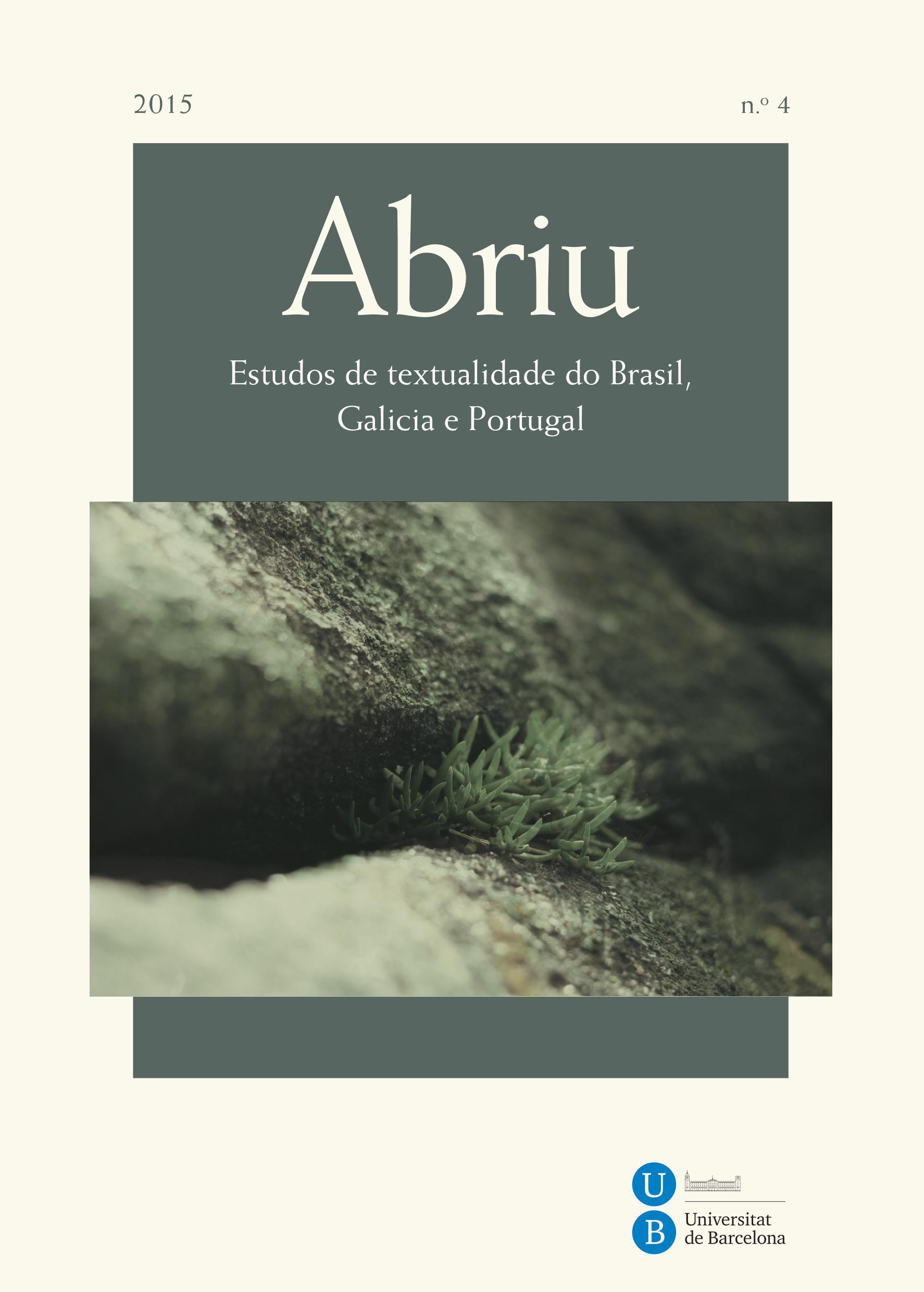
Olga Castro and María Liñeira (issue editors)
The fourth issue of Abriu, the international scientific journal edited by Estudis Gallecs i Portuguesos, Universitat de Barcelona (Galician and Portuguese Studies, University of Barcelona), includes the monograph "Crevices Exposed: Blind Spots in Galician Textuality", edited by Olga Castro and María Liñeira. It explores the textual and symbolic nooks and crannies found in the work of Manuel Rivas, Xela Arias, Suso de Toro, and Ricard Salvat, and a case study of Luis Pimentel and the problematization of linguistic criterion. "Miscellany" collects works on Hélder Faife, Marcelo Mirisola, and João Cabral de Melo Neto. "Reviews" analyses studies on Clarice Lispector, José Saramago, and contemporary Galician identity, as well as Brazilian poetry and Verísimo’s translations. It is published simultaneously in print and electronically, as an e-book (see Publicacions i Edicions de la Universitat de Barcelona).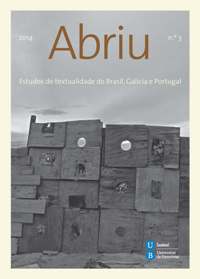
Elena Losada Soler (issue editor)
The third issue of Abriu, the international scientific journal edited by Estudis Gallecs i Portuguesos, Universitat de Barcelona (Galician and Portuguese Studies, University of Barcelona) includes the monograph “Noir and Criminal: Favela Novels and Other Fractured Genres”, edited by Elena Losada Soler. The monograph includes studies of well-known writers of detective and noir fiction, particularly in Brazil, and also explores hybrid forms such as the “favela novel” and the crime novel as bildungsroman. The “Miscellany” section collects works on Galician women writers and feminist criticism. Critical analyses of monograph length studies on literature and translation comprise the “Reviews” section. It is published simultaneously in print and electronically, as an e-book (see Publicacions i Edicions de la Universitat de Barcelona).
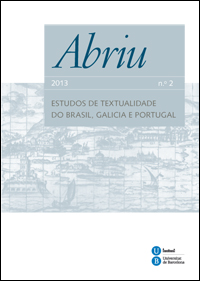
Isabel Soler (issue editor)
This is the second issue of Abriu, the annual international scientific journal edited by Estudis Gallecs i Portuguesos, Universitat de Barcelona (Galician and Portuguese Studies, University of Barcelona). This issue includes a monograph on “Renaissance Dialogs between Orient and the West”, edited by Isabel Soler, on the sea voyage from the perspective of cartography, botany, philology as well as news on the reality of the voyage. The “Miscellany” section includes works on Rosalía de Castro, José Ángel Valente and Ondjaki. Critical analysis of monographic studies on literature and translation comprise the “Reviews” section. It is published simultaneously in print and electronically, as an e-book (see Publicacions i Edicions de la Universitat de Barcelona).
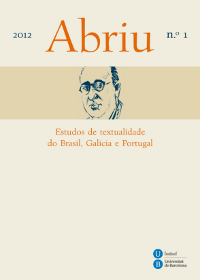
María Xesús Lama López (Issue Editor)
This is the inaugural issue of the annual international scientific journal edited by Estudis Gallecs i Portuguesos, Universitat de Barcelona (Galician and Portuguese Studies, University of Barcelona), and directed by Helena González Fernández. This issue includes a monograph on the relationship between the Galician writer and gourmet Álvaro Cunqueiro and Catalan culture. The sections “Miscellany” and “Reviews” include various works on Portuguese, Brasilian and Galician literature. It is published simultaneously in print and electronically, as an e-book (see Publicacions i Edicions de la Universitat de Barcelona).
Indexing & metrics
Scopus, ESCI, ERIHPlus, Google Scholar, MIAR... See more
Social network
Academia.edu, Twitter